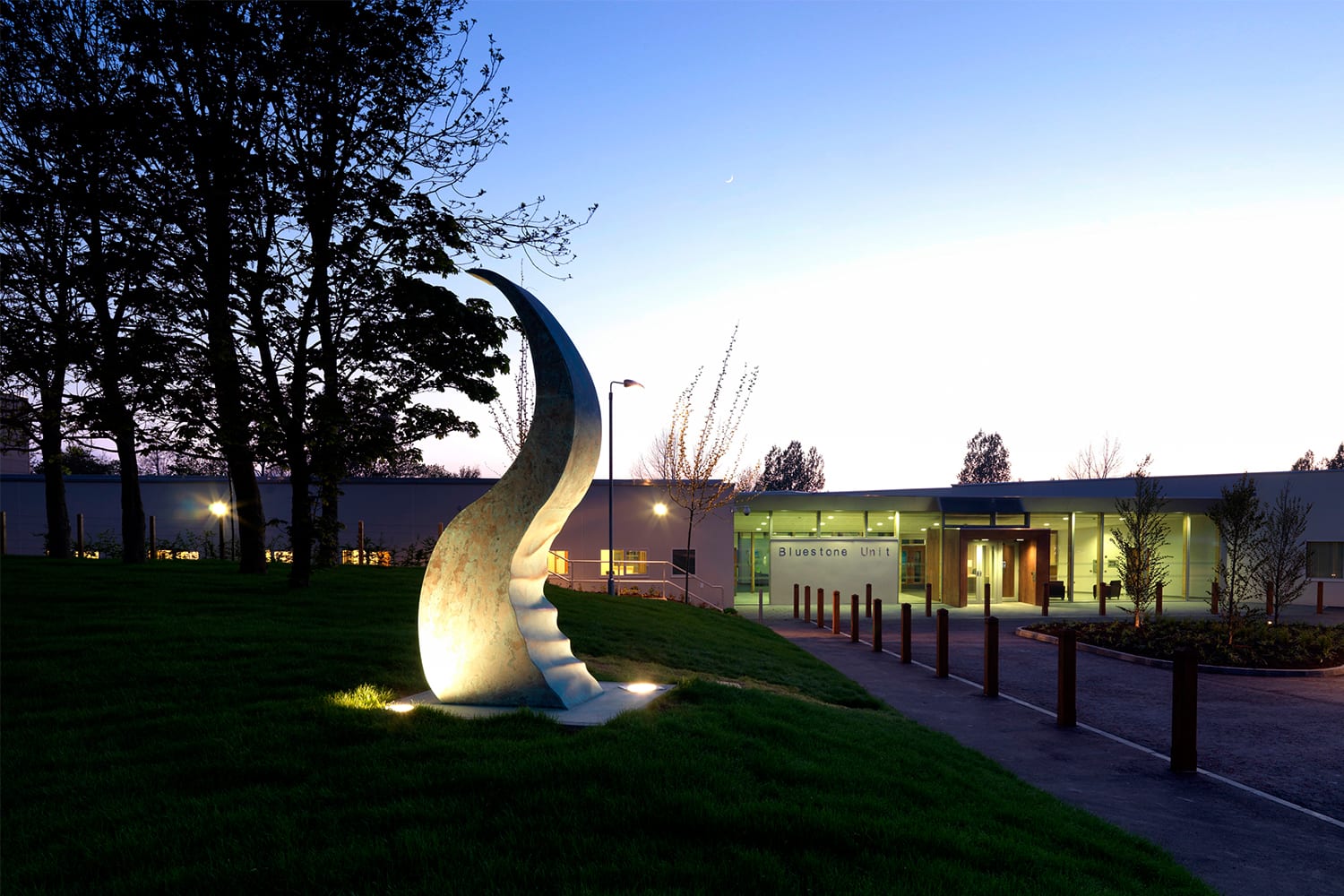
A County Armagh woman has spoken of the dire – and “failing” – state of the Southern Trust’s mental health services of which she is a service user.
Amanda*, who only last month tried to end her own life in the Bluestone facility in Craigavon, only to be sent home 12 hours later, says the service is not at breaking point – “it is already broken”.
A young woman, who is in her early 20s, Amanda first required the services of the Trust’s mental health team at the age of 18, after her own attempt to end her life. fliga
At the start, Amanda didn’t know what to expect when she first encountered the mental health services, admitting it “wasn’t horrible, but it wasn’t great either”.
However, “knowing what I know now”, Amanda – who has been in the Bluestone unit upwards of 25 times since her first admission – says her view on the whole system “has completely changed”.
Amanda reached out to Armagh I in a bid to highlight the issues she has encountered and offer up her experiences on a service “crying out for staff and beds”. She also wanted to highlight how that is having an impact on the patients, and the “shocking” rate of suicide locally, especially among people who have used the service.
“Nobody is talking about this, not really,” said Amanda.
The number of officially recorded suicides in Northern Ireland for 2021 was 237 – 18 more than the number recorded in 2020. There have been no figures released for 2022.
“In an eight week period for Bluestone there were 7-8 discharges who went on to end their own life,” Amanda claimed. “It made me think, ‘something is very wrong here’.”
During one of her many visits to Bluestone, Amanda said that of the 18-19 bed ward – which was full – at least 85% of the occupants there were “people I knew; there were patients in there coming back in because the services in the community aren’t enough”.
Amanda says changes to how Bluestone is staffed in recent months have only exacerbated the issues.
“There is one specific consultant per ward now and they don’t like keeping people in too long; it’s about getting beds emptied as quickly as possible.
“Staffing levels needs addressed. For example, I know at the minute there is no consultant in community for the Lurgan team. And GPs will go nowhere near you if you’re under the mental health teams so people are often left with little to no help.
“I don’t even know who my consultant is. Consultants they do have, are coming in and out. I had a good relationship with one who left in January and whenever they changed the old system it completely threw me.”
Amanda says that her outward persona, like a lot of people with mental health difficulties, is one that doesn’t convey the pain and anguish beneath the surface. That in itself has been an issue for Amanda who says she is often “dismissed”.
“I can hold a conversation which deems me to have capacity, but I have a diagnosis of emotionally unstable personality disorder and with that comes a very unregulated emotional state.
“So, I could be on a high, I could be on a low, it really, really varies. But whenever I’m in a lot of distress, I would argue that the capacity isn’t there. I will be making decisions which a normal person – looking on the outside – would not make.
“There are a lot of the things that I’ve done that aren’t really very glamorous. You name it I’ve done it all.
“I went into hospital on Saturday evening, brought in by the police after being found in my car with a rope and I was admitted to Bluestone. On the Sunday morning, I was clearly still in distress, nobody could deny that; I personally don’t think anybody can deny it.
“I spoke to a nurse and told her I don’t feel safe if I go home but I that I still wanted to go home regardless. And I think that’s where the doctor should be stepping in and saying, ‘no, you’re not fit to go home’. They pull out the personal responsibility card – one of the most used phrases within the mental health system is ‘personal responsibility’.”
She added: “I got out on Monday and I was still in a very distressed state but the consultant, he writes a discharge letter to your GP and it gives the reason for your admission and then a reason for your discharge. And on mine, he wrote that I had an improved mental state, which just wasn’t the case.
“I told him I was hopeless and there was no point in going on. I was very, very honest. There are times when I’m not, where I will cover my own ass just to get out.
“My mum did actually dispute that with the nurse, and the nurse apparently went and asked if I could stay. The consultant said no. I did actually tell him I wanted to go home but they took that over what was evident to everyone else around me – that I wasn’t fit to go home. And there lies the problem with ‘personal responsibility’.
“To be perfectly honest, the night before (Sunday), I had had an incident where I was found practically unconscious. But the next day I wanted to go home because I felt I wasn’t going to get anywhere with him.
“In some ways, home is better, like your own bed is amazing. Getting into your own bed after hospital bed is the best feeling but should I really have been discharged is a question a lot of people would would argue I shouldn’t have been allowed.”
Amanda says one of her biggest frustration lies in the inconsistency of the approach within the service.
“It really depends on who you see. I know friends who have gone in after trying to commit suicide and let go straight home. Others go in saying they’re feeling suicidal and they’re detained. There’s just no consistency whatsoever.”
Amanda is one of many desperate for help but the instability of a system, she says can barely support itself, is making her life difficult and with that difficulty comes the rush of troubled thoughts.
“I question whether I want to live regularly,” said Amanda. “There are days when life just does not seem worth it and then there are days where I’m a wee bit more motivated. You know, maybe I have a purpose. And at the moment I’ve taken that into my head that, I want to make a wee bit of a difference.
“I’m feeling better now, so I can kind of look at it – the state of the health service – and question it all but it’s really hard to wrap my head around it.
“It’s a bit of a s***show. I understand it’s budgetary but mental health needs money spent on it. The Trust is screaming out for beds. I ended up spending the night on a sofa in the living room at Bluestone and they had to have a member of staff sit with me because I couldn’t be on my own; there wasn’t a single bed in Northern Ireland.
“There are some great key workers and staff but they are just so limited in what they can do. I even had a consultant reach out to the Belfast Trust for a service, for me and for others, just to be told to make do with what you have, which is very little.”
She added: “There are some staff who recommend medication, there are others who will strip you off it and tell you to go to therapy but there’s no therapy. I have been referred to a psychologist but I’ve never met him – not through any choice of my own. It has just been that long of a wait.”
Amanda referenced a diary she once kept on ways to harm herself.
“It just blows my mind that I even got to that stage; it shouldn’t be like that. Our mental health services are failing and something needs done.”
A spokesperson for the Southern Trust said: “The Trust offers a range of inpatient and community based mental health services across the Southern area. Following assessment, services offered from the multidisciplinary team will be tailored to meet the needs of each patient to support their recovery.
“With rising demand for services, like all specialties across health and social care, locally, regionally and nationally, there are workforce challenges in mental health and staff are doing their very best under difficult circumstances. Whilst there are vacancies in some areas of our services, recruitment efforts are ongoing and new measures in place to improve multi-disciplinary staffing.
“Consultant Psychiatrists previously looked after both inpatients and community patients in a dedicated geographical area. Since January 2023, whilst they remain aligned to the same geographical catchment, akin to other Trusts, consultants now work in either inpatient or outpatient settings.
“Southern Trust Mental Health Services are active participants in the work of the regional ‘Towards Zero Suicide collaborative’ which aims to identify and respond to patients at risk of suicide as quickly as possible. In partnership with every patient admitted to Bluestone and their family, we undertake a risk assessment and management plan. This is also completed and updated within the community mental health teams.
“There are six psychologists working across the Southern Trust area specialising in Forensics and Adult Mental Health. This is a trust wide service, however clinics are provided in patient localities.
“We encourage anyone with any concerns or queries about their services to contact our Service User Feedback Team: Tel: (028) 3756 4600 Email: serviceuserfeedback@southerntrust.hscni.net.”
Need help? Contact any of these services..
Lifeline (external link opens in a new window / tab)– Phone 0808 808 8000
Samaritans(external link opens in a new window / tab) – Freephone 116 123
*We have changed the woman’s name in order to protect her identity.



